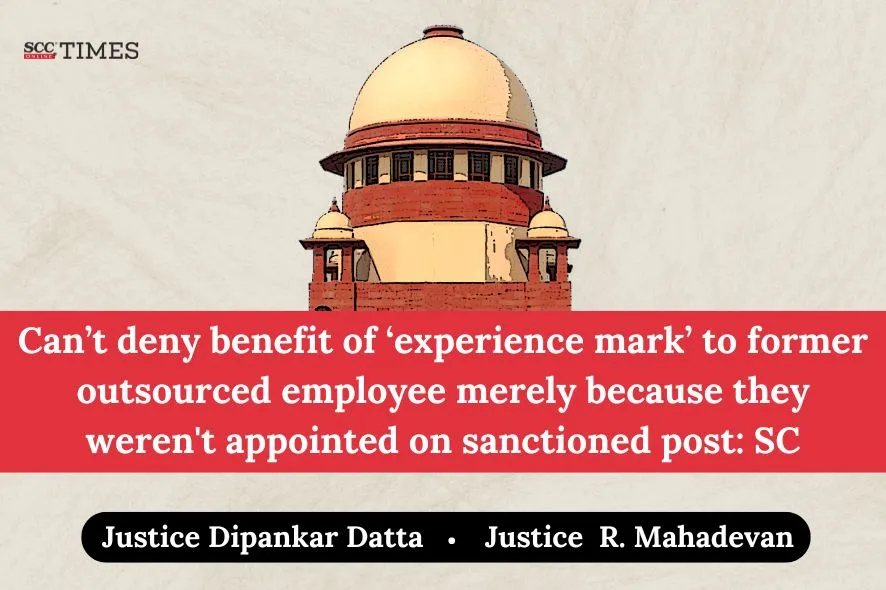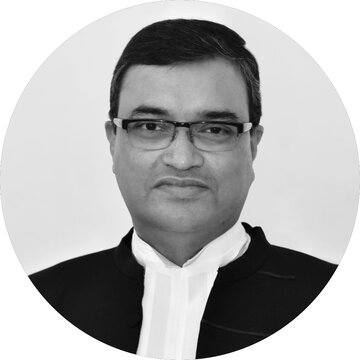Supreme Court: While considering the instant appeal challenging the decision of Division Bench of Punjab and Haryana High Court whereby directions were given to consider the 1st Respondent for appointment in Chaudhary Charan Singh Haryana Agricultural University on the post of Clerk; the Division Bench of Dipankar Datta* and R. Mahadevan, JJ., concurred with the decision of the High Court stating that 1st Respondent could not be denied the benefit of mark for experience merely because at the time of appointment as outsourced manpower, she was not appointed on a sanctioned post.
The Court further emphasised that the true thrust of every selection process ought to be to find out and select suitable candidates, having experience in the related work and fulfilling other criteria, from among eligible candidates and to go ahead with appointing the more meritorious of those found suitable. If indeed an individual without having any security of service performs up to the mark and receives commendation from none other than the Head of the Department, who must have closely watched his/her performance, it would occasion a failure of justice to exclude such individual for no better reason than that he/she did not work on a sanctioned post. “If indeed such be the requirement, it had to be made explicitly clear in the Advertisement without any ambiguity so as not to generate false hopes in the minds of individuals aspiring for public employment”. The Court held that Constitutional mandate prescribed in Articles 14 and 16 read with the Preambular promise of securing social justice, means that non-grant of mark for experience to the 1st Respondent was not proper and legal.
Background:
Chaudhary Charan Singh Haryana Agricultural University (the University) was established in 1970. In 2009, the State of Haryana introduced an outsourcing policy relating to engagement of persons on contract basis through service providers. This circular was adopted by the University vide memo dated 24-02-2010. In 2014, the State issued a further Circular relating to issuance of experience certificates to persons engaged under the outsourcing policy. This circular too was adopted by the University on 25-06-2014. In 2017, the University invited tenders for the purpose of providing manpower relating to office/hospitality and lab/technical under Part I of the Outsourcing Policy and vide and Office Order dated 29-03-2017, the contract was awarded to two service agencies by the University. The 1st Respondent was engaged by one of the service agencies, to work as a clerk-cum-typist as outsourced manpower for the period between 05-05-2017 and 31-03-2018 in the University. She was awarded a certificate of experience by the agency and this certificate was countersigned by the Professor and Head of the Department of Soil Science of the University.
Thereafter, vide an advertisement, the University invited applications for direct recruitment to various Group-C (non-teaching) posts. Under the criteria for selection, the advertisement prescribed marks for ‘Experience’. It specified that half a mark (0.5) would be given for experience in the same or higher post in any department / board / corporation / company / statutory body / commission / authority of the Government of Haryana, for each year or part thereof which exceeds six months but limited to a maximum of ten (10) years.
In pursuance of the advertisement, the 1st Respondent had applied and offered her candidature and scored 75 marks in the written test and was, accordingly, placed in the merit list, but fell short of selection. Aggrieved, she invoked writ jurisdiction of the High Court. The Single Judge Bench of the High Court held that 1st Respondent was eligible 0.5 mark for the service rendered by her between 05-05-2017 and 31-03-2018; this decision was also affirmed by the Division Bench.
Contentions:
Aggrieved, the University preferred the instant appeal and argued that since the 1st Respondent was engaged in the University by the agency under the Outsourcing Policy for the requirements of office work and not appointed on any regular or sanctioned post of clerk, the experience acquired by her cannot be equated with the experience of working on a sanctioned post of clerk. Considering that the post was not a regular or sanctioned post, the 1st Respondent could not be deemed to have gained experience of working in the same or higher post, as required by the Advertisement. It was further argued that the Experience Certificate to the 1st Respondent was issued by the agency, therefore, merely because it was countersigned by the Head of the Department does not make it a certificate issued by the University.
Per contra, counsel for the 1st Respondent argued that though she had rendered services to the University on contract, she had done the work like other similarly situated persons working under either the outsourcing policy or on regular basis. It was contended that the University did not disclose the fact that the post of Clerk-cum- Typist is a sanctioned post. Furthermore, as per the Policy, the essential requirement of experience is that the candidate must be working in any department of the Government of Haryana irrespective of the mode of recruitment because government institutes can hire manpower in any of the two modes and in both the cases, work is done in the government department. Denying marks of experience to the first respondent is unreasonable, arbitrary and violative of Articles 14, 15, 16, 19 and 21 of the Constitution.
Court’s Assessment:
Perusing the matter, the Court considered whether 1st Respondent, in terms of the Advertisement, was eligible to be awarded half a mark (0.5) under the category of ‘experience’ vis-à-vis her engagement as outsourced manpower for the concerned time period, in light of the Rules and Circulars of the State as adopted by the University.
The deliberated that whether the noun ‘post’ in the subject advertisement would invariably mean a sanctioned post and whether a candidate would not be eligible for mark for experience if he/she has not worked on a regular/sanctioned post. The Court referred to Kumar Bar Das v. Utkal University, (1999) 1 SCC 453, wherein 3-Judge Bench of the Court observed that one must not apply the words in the advertisement in a technical sense but must rather give effect to the words mentioned in the advertisement.
The Court referred to several related precedents and observed that it cannot be gainsaid that even though the modalities for engagement of two individuals for executing similar nature of work could differ, there can be no quarrel that none can gain experience without being asked to work.
The Court further stated that one vital difference in working on a sanctioned post as a permanent employee and being employed in the exigencies of administration without having a right to post is that in the former, the appointee enjoys procedural safeguards bringing in a sense of security of service in him; while in the latter the individual concerned may not have any such sense of security. However, in case, both perform the work of clerks, the experience gained would not be much at a variance subject, of course that the job requirement is not too different.
Focusing on the advertisement issued by the University, the Court pointed out that a literal reading of the terms relating to experience confirms that marks could be secured by an aspirant for experience gathered while working in the enumerated departments of the Government of Haryana; however, while referring to ‘same or a higher post’, the term ‘sanctioned’ as a prefix is conspicuous by its absence.
Furthermore, neither the Outsourcing Policy nor the Advertisement defines the word “post”. What follows is that an aspirant, to secure mark for experience, must prove with documents that he/she has been employed for performing work of the nature required by the same or a higher post. Importantly, it has not been shown that either the Recruitment Rules or the Advertisement specifically bar(s) aspirants from securing marks for experience sained from contractual / outsourced employment. Thus, the Court held that the mode of employment is not the primary concern; the primary concern is the nature of work performed and whether the work undertaken by the candidate has any nexus with the purported work to be undertaken during the course of regular service.
Therefore, since the 1st respondent had rendered service for a statutory body in excess of six months and is therefore covered by the Advertisement, there is no doubt that she had a valid claim for securing 0.5 mark for experience.
The Court further explained that the state policy, specifying that the individual must have worked on a post equal to or higher than the advertised posts in any of the enumerated departments to secure marks for experience, also reflects the state’s belief that the experience in such departments is directly relevant to the advertised posts. It is not open for the University to now deny marks on the basis of a technical procedural deviation that the experience certificate was not issued by the University, but rather by the service provider.
The Court further stated that though Experience Certificate to the 1st Respondent was given by the agency, but the fact that it was countersigned by the Head of the Department validates the 1st Respondent’s claim that she had indeed gained certain experience which deserved to be given credit.
The Court also emphasised that the Constitutional theme is centered around “social justice”. The Preamble, as well as Article 38 of the Constitution, enjoins upon the State instrumentalities the duty to promote the welfare of the people by securing and protecting, as effectively as it may, a social order, in which justice — social, economic and political — shall inform all the institutions of national life and endeavour to eliminate inequalities in status, facilities and opportunities.
“Whenever a conflict arises between the powerful and the powerless, social justice commands the Courts to lean in favour of the weaker and poorer sections where the scales are evenly balanced”.
Hence the Court decided that refusal to award any mark for experience to the 1st Respondent would go against the grain of the constitutional duty of ensuring equality and securing social justice for the deprived.
CASE DETAILS
|
Citation: Appellants : Respondents : |
Advocates who appeared in this case For Petitioner(s): For Respondent(s): |
CORAM :








